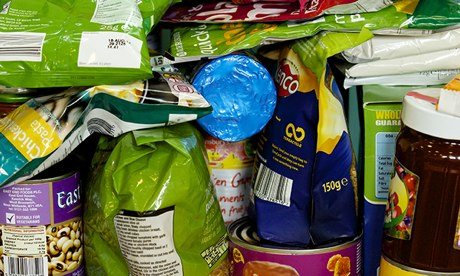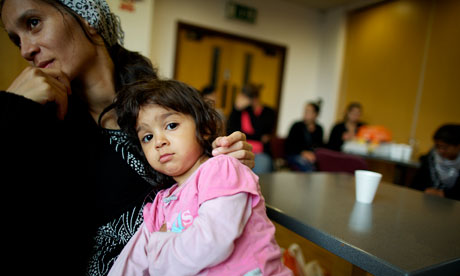Conservatives cannot admit a real fear of hunger afflicts thousands

Donated food at a a food bank. Photograph: Christopher Thomond for the Guardian
I went to the Trussell Trust food bank round the corner from the Observer's offices just before Christmas. If I hadn't been reading the papers, I would have assumed it represented everything Conservatives admire. As at every other food bank, volunteers who are overwhelmingly churchgoers ran it and organised charitable donations from the public.
What could be closer to Edmund Burke's vision of the best of England that David Cameron says inspired his "big society"? You will remember that in his philippic against the French revolution, Burke said his contemporaries should reject its dangerously grandiose ambitions , and learn that "to love the little platoons we belong to in society, is the first principle (the germ, as it were) of public affections". Yet when confronted with displays of public affection – not in 1790 but in 2013 – the coalition turns its big guns on the little platoons.
It would have been easy for the government to say that it was concerned that so many had become so desperate. This was Britain, minsters might have argued, not some sun-beaten African kleptocracy. Regardless of politics, it was a matter of common decency and national pride that Britain should not be a land where hundreds of thousands cannot afford to eat. The coalition might not have meant every word or indeed any word. But it would have been in its self-interest to emit a few soothing expressions of concern, and offer a few tweaks to an inhumanely inefficient benefits system, if only to allay public concern about the rotten state of the nation.
But the coalition is not even prepared to play the hypocrite. Iain Duncan Smith showed why he never won the VC when he was in the Scots Guards when he refused to face the Labour benches as the Commons debated food banks on 18 December. He pushed forward his deputy, one Esther McVey, a former "TV personality". All she could say was that hunger was Labour's fault for wrecking the economy. She gave no hint that her government had been in power for three years during which the number attending food banks had risen from 41,000 in 2010 to more than 500,000. Her remedy was for the coalition to help more people into work.
If she had bothered talking to the Trussell Trust, it would have told her that low-paid work is no answer. Its 1,000 or so distribution points serve working families, who have no money left for food once they have paid exorbitant rent and fuel bills.
But then no one in power wants to talk to the trust. As the Observer revealed, Chris Mould, its director, wrote to Duncan Smith asking if they could discuss cheap ways of reducing hunger: speeding up appeals against benefit cuts; or stopping the endemic little Hitlerism in job centres, which results in unjust punishments for trivial transgressions. In other words, a Christian charity, which was turning the "big society" from waffle into a practical reality, was making a civil request. Duncan Smith responded with abuse. The charity's claims to be "non-partisan" were a sham, he said. The Trussell Trust was filled with "scaremongering" media whores, desperate to keep their names in the papers. But he had their measure.
Oh, yes. "I understand that a feature of your business model must require you to continuously achieve publicity, but I'm concerned that you are now seeking to do this by making your political opposition to welfare reform overtly clear."
Ministers will not confess to making a mistake for fear of damaging their careers. But it is not only their reputations but an entire world view that is at stake. Put bluntly, the Conservatives hope to scrape the 2015 election by convincing a large enough minority that welfare scroungers are stealing their money. They cannot admit that a real fear of hunger afflicts hundreds of thousands. Hence, Lord Freud, the government's adviser on welfare reform, had to explain away food banks by saying: "There is an almost infinite demand for a free good."
My visit to the food bank showed that our leaders' ignorance has become a deliberate refusal to face a social crisis. Of course, the volunteers help working families and students as well as the unemployed and pensioners. Everyone apart from ministers knows about in-work poverty. As preposterous is the Tory notion that the banks are filled with freeloaders.
You cannot just swan in. You get nothing unless a charity or public agency has assessed your need and given you a voucher. The trust is at pains to make sure that the beggars – for hundreds of thousands of beggars is what Britain now has – receive a balanced diet. To feed a couple for five days, it gives: one medium pack of cereal, 80 teabags, a carton of milk, two cans apiece of soup, beans, tomatoes and vegetables, two portions of meat and fish, fruit, rice pudding, sugar, pasta and juice. That this is hardly a feast is confirmed by the short list of "treats", which, "when available", consist of "one bar of chocolate and one jar of jam".
Sharon Cumberbatch, who runs the centre, tells me that she is so worried that shame will deter her potential clients that she packages food in supermarket bags so no one need know its source. The clients, when I met them, reinforced her point that they were not the brazen freeloaders of Tory nightmare. They trembled when they told me how they did not know how they would make it into the new year.
Most of all, it was the volunteers who were a living reproof to a coalition that can cannot correct its errors. They not only distribute food but collect it. They stand outside supermarkets all day asking strangers to buy the tinned food they need or hand out leaflets in the streets or plead with businesses to help. Sharon Cumberbatch is unemployed but she works to help others for nothing. Her colleagues said they manned the bank because hunger in modern Britain was a sign of a country that was falling apart. Or as one volunteer, Richard Moorhead, put it to me: "I am gobsmacked that people are going hungry. I'm ashamed."
The coalition can call such attitudes political if it wants – in the broadest sense they are. But they are also patriotic, neighbourly, charitable and kind. They come from people who represent a Britain the Conservative party once claimed a kinship with, and now cannot bring itself to talk to.


